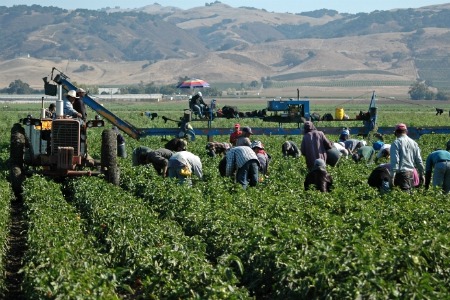Res Judicata: Americans Will Do the Jobs

“On lesser days, unmentionable objects block the huge grates in the sewer channels. The workers descend knee deep into the muck and scrape at the dripping clogs. The gunk drips to their shoulders and splashes on their faces, working its way into pores and psyches.” This is how the New York Times described the work of sewage treatment workers in a story last year about their fight for higher pay.
The workers at New York City’s 14 sewage treatment plants are represented by a union, like all public employees in major cities, and earned (at the end of their successful contract dispute) an average of $34.97/hour ($72,000/year) plus health and pension benefits. Plant managers’ pay tops out at $53.99/hour. Surprisingly, to anyone who has bought into the argument that Americans are spoiled brats who won’t do such work, the workers pictured in the photo accompanying the article were all white and presumably (though I cannot vouch for this) in the country legally. They did not look like farmworkers.
The piece goes on to report that the starting salary for sewage workers in Los Angeles is $71,000/year plus benefits. The Bureau of Labor Statistics indicates that the national average compensation for “Liquid Waste Treatment Plant and System Operators” is $38,000 plus benefits. When is the last time we read of a labor shortage in our sewers, surely as unappealing a job as exists in our economy? Never. The reason is sewer workers are paid a market wage, or likely higher because labor unions are basically worker cartels that coerce employers to pay supra-competetive wage rates plus expensive health and pension benefits.
I am reading a lot these days about the “shortage” of agriculture workers in Georgia, which recently passed a law requiring all employers to use the E-Verify online system to check the legal status of job applicants. (Last month I wrote about the recent Supreme Court decision upholding a similar law in Arizona. So I expect to be hearing about a shortage of workers in that state too.) There is no doubt that picking fruit and vegetables in very hot weather is unappealing work. But it is a myth propagated by the cheap labor lobby and organizations like National Council of La Raza, an Hispanic pressure group seeking unlimited immigration, that Americans will not do unappealing work. The sewer example proves they will.
The question we should ask farmers who complain about labor shortages is: why they pay extremely low wages? (Usually pegged to the minimum wage and typically not including health insurance.) The answer is simple. Because illegal immigrants will take those jobs at those wages. As one farmer in Collinsville, Illinois told me, “the Mexicans like to sweat out there in the fields and don’t complain. They laugh and have fun. You can’t get a white person to do that.” And the farmer feels no pressure to pay higher wages as long as his Mexican workers keep showing up each spring for the season. I asked him what he would do without the Mexican immigrants (whom he insists are in the country legally, which I doubt). He said he’d go out of business.
Would the entire American agriculture industry go bankrupt if it could not hire illegal immigrants at the minimum wage? Basic economics teaches that farmers will try to automate labor. This has long been done in the Midwest, where corn and soybeans, the largest crops, are harvested by machines called combines. The farmer I mentioned above in southern Illinois maintains a smaller, family-owned farm and apparently can’t afford a combine for his corn or chooses not to use one. If his average total cost of production exceeds his competitors, then he should be unable to compete. He should not be propped up by illegal labor. It’s both inefficient and criminal. Yet he sees himself as a sort of heroic Jeffersonian yeoman farmer stoutly resisiting automation, as if corn picked by a sweaty Mexican is more authentic than corn harvested by a combine.
In Europe and Australia many vintners have been using grape picking machines since the 1960’s. A single harvester running 24 hours can pick 80-200 tons of grapes. A person can only pick 1-2 tons in the same period. Large American fruit growers on the West Coast have not mechanized their harvesting. The reason is our government is subsiding their inefficiency by the non-enforcement of the immigration laws. There may not currently be a harvesting machine capable of picking apples and oranges, but necessity is the mother of invention. Grape harvesters work by shaking the vines until the grapes fall off. I’m no engineer, but I don’t see why a comparable device can’t be developed to shake the branches of fruit trees.
But if no such device can be invented by American engineers, then our farmers should have to pay market wages so legal American workers will do the harvesting. If that means something approaching what sewer workers earn in these rural areas, then so be it. And if that means the farmers’ average total cost of production rises to beyond what Japanese and Chinese farmers pay to harvest apples, then we should consume Japanese and Chinese apples. The loss of these jobs will not hurt our economy or raise the unemployment rate because the fired workers are not Americans. It may send a lot of illegal Mexicans back home. But we have enough unemployment to worry about here.
Originally posted at Foster PC

